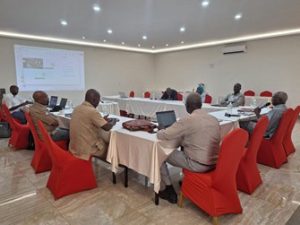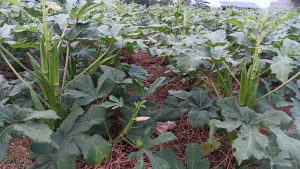TAAT Wheat Compact Seed Sector Success Story: The Case of Sudan
Wheat is one of the most important agricultural commodities in Sudan for food security in terms of quantity and calories consumed. Currently, wheat in Sudan is grown on approximately 201,000 ha under irrigation with an average productivity of 2.5 t/ha. The annual wheat production stands at 513,000 MT, representing about 22 % of the total national requirement of 2 million MT. Consequently, the ever-widening gap between local production and consumption has created a huge shortfall that is primarily met by imports, which drains the Sudan economy over 500 million dollars per year in foreign exchange.
On the other hand, the Sudan national agricultural research system in collaboration with international partners (such as ICARDA, CIMMYT) has developed and released a number of high yielding heat tolerant wheat varieties with production potential of 5-8 t/ha. Recent experiences to promote these heat tolerant wheat varieties in Sudan through the AfDB-funded SARD-SC (wheat) project revealed that technology adopting wheat farmers at project intervention sites increased their wheat productivity to 4-7 t/ha, while farmers with their traditional varieties rarely exceed 2.5 t/ha. Despite this potential, the lack of improved wheat seed in sufficient quantity and quality at affordable price is widely regarded as a driving factor significantly contributing to the poor adoption and weak performance of this crop in Sudan
Within the framework of the AfDB funded TAAT Program, Sudan is one of the target countries implementing the TAAT wheat compact with the objective to scale up proven wheat technologies for achieving a widespread and transformative impact in terms of enhancing productivity, farmers’ income, job creation, and value addition; all leading towards attaining higher levels of wheat self-sufficiency. For the realization of this ambitious objective in Sudan, the TAAT wheat compact has identified the lack of improved wheat seed in sufficient quantity and quality at affordable price is a major constraint challenging its technology scaling up and dissemination activities.
Approaches for transforming the wheat seed sector
Building on the previous SARD-SC wheat experience, The TAAT wheat compact initiated its intervention in Sudan in 2018 with a bold plan to transform the wheat seed sector in collaboration with all concerned national partners involved in wheat seed production and delivery. Accordingly, the TAAT Wheat compact organized a National Wheat Seed Sector Stakeholders Consultation and Joint Planning Workshop that was held on 28–30 June 2018 in Khartoum, Sudan. The workshop was attended by a total of 52 invited stakeholders drawn from all partner organizations involved in the wheat seed sector including NARS, public and private seed companies, and senior policy and decision makers of the Ministry of Agriculture and Forests (MoAF). The meeting was officially opened by H.E. the state Minister of Agriculture, where he expressed the country’s commitment to implement the TAAT wheat scaling up activities and transform domestic production for achieving wheat self-sufficiency within 3-5 years. Based on the discussion and outcomes of the joint planning workshop, the stakeholders unanimously agreed on the 2018 work plan developed which emphasized on the following priority TAAT wheat interventions that are critical to transform the wheat seed sector in Sudan. These included: 1) the 2018 accelerated plan for the production and delivery of different classes of wheat seed (breeder, basic and certified seed of newly released and demand-driven wheat varieties) and capacity building, 2) analysis of the country wheat seed sector for developing a national wheat seed road map aligned with the country strategy that will provide targets for seed production to achieve wheat self-sufficiency by 2025 and 3) participatory monitoring and evaluation system for implementing the planned activities and achieving the anticipated targets. This workshop was extremely successful in terms of creating common vision on the TAAT wheat objectives and expected targets, and for building consensus and buy-in on the roles and contribution of each of the partners during the project implementation.
The TAAT wheat compact in Sudan has worked in two directions to diversity of the seed sector within the concept of integrated seed sector development embracing both formal (public and private seed companies), and informal (farmer-based) seed systems. In this regard, particular attention has been given to train, capacitate and engage youth and women in commercial seed production and marketing.
Accelerated seed multiplication and delivery
Following the successful implementation of the planned TAAT wheat seed activities in Sudan, the private seed enterprises in the country (such as ASSCO, NileSun Enterprise, Makeen Seed Company, MS inputs & Services, Rajhi Investment Co. etc.) have grown over 850 tons of basic seed of five popular wheat varieties (Imam, Goumria, Zakia, Elnielain and Bohaine) on more than 11,000 ha at different locations. As a result, more than 26,000 tons of certified seed is expected to be produced that can be distributed to benefit more than 260,000 wheat farmers in the coming season. The certified seed produced will account for more than 80% of the total seed required to cover the targeted wheat area in 2019/20. In addition, 180 tons of pre-basic seed of the most recently released heat tolerant wheat varieties have been cultivated on 2100 ha involving a number of public and private seed enterprises (such as Makeen Seed Company, Social Security Investment Authority, Authority of Merowi Dam Area for Agricultural Development, New Halfa Agric Corporation) with the expected harvest exceeding 4200 tons of basic seed at the end of the season. This in turn, could be partly grown on more than 25,000 ha in 2019/20 to produce over 55,000 tons of certified seed, which is enough to cultivate wheat area exceeding 500,000 ha in 2020/21.
As part of the effort made by the TAAT wheat compact to strengthen the informal seed sector through providing technical support and field backstopping, 14 tons of seed of six demand driven wheat varieties have been cultivated on 140 ha by a number of organized pioneer farmer groups engaged in the informal community based seed production. It is expected to produce more than 300 tons of quality declared seed that can be distributed to benefit more than 6000 smallholder wheat farmers in 2019/20. This intervention is particularly beneficial to wheat farmers who are remotely located with poor infrastructure and limited access to improved seed produced by the formal seed sector.
Capacity strengthening of the seed sector stakeholders through a tailor made training course on the various aspects of improved seed production and management techniques was conducted targeting seed specialists drawn from the formal sector (7 private and 3 public seed enterprises) during 18-24 October 2018 at Wad Medani, Sudan. Accordingly, the theoretical know-how and prectical skill of 58 (42% youth and women) seed production technicians and specialists strengthened. Furthermore, direct field technical backstopping was provided to different wheat seed companies engaged in commercial seed production. Similarly, 38 (40% youth) farmers involved in the informal community based seed production have been capacitated through providing hands-on training at farmers field schools and a follow up field technical backstopping on different aspects of seed production techniques. This capacity building activity was extremely productive that should continue in the subsequent years in order to ensure the production and supply of high quality wheat seed sustainably and towards transforming the wheat seed system in Sudan
Development of the national wheat seed road map
The TAAT wheat compact carried out analysis of the national wheat seed system with the objective to strengthen the wheat seed system and formulate a wheat seed road map that are aligned with the country strategy in order to meet the goals and objectives of wheat sector transformation for achieving the anticipated wheat self-sufficiency in Sudan within the coming 3-5 years. The development of the national wheat seed road map was carried out with active involvement of all concerned stakeholders including policy makers, concerned government agencies associated to wheat seed and grain production, and key stakeholders from the private sector engaged in wheat seed production and marketing.
Based on the findings of the review, there are three key issues that need to converge to meet the anticipated goals of achieving wheat self-sufficiency in 2025: i) projected changes in domestic demand for wheat during the period, ii) the technical changes in raising the productivity levels to reach the target production and iii) the availability of land for expansion to meet the target area. The wheat seed road map was developed based on the country strategy and defines the critical investments that are needed for each key component of the seed value chain that enable to produce sufficient quantity seed of desired quality and provide to farmers at the tight place, time and price making use of the diversity of the national seed sector. Moreover, the seed road map provides targets for production of different classes of seed taking into account area expansion and desired level of seed replacement rate. For any given year, a four-year production cycle (breeder, pre-basic, basic and certified seed) is required to achieve the amount of certified seed. Accordingly, for the certified seed production planned in 2022, the breeder, pre-basic and basic seed should be produced in 2018, 2019 and 2020, respectively. Based on this assumption, the wheat seed road map was developed for Sudan until 2025.
Finally, as part of the outcomes of the National Wheat Seed Sector Stakeholders Consultation and Joint Planning Workshop, the following key recommendations were outlined by participants to strengthen the national wheat seed system in Sudan:
- Establishment of a national forum (platform) for planning, production and marketing of wheat seeds involving all concerned stakeholders such as NARS, public and private seed producers and suppliers and Ministry of Agriculture, development partners, commercial farms
- The need for stable and sustained enabling policies that enhance the competitiveness of domestic wheat production and encourage the private sector to be enrolled in the wheat seed and grain production, processing and marketing
- The importance of introducing innovative and supportive financial and insurance policies for agricultural production that would support wheat farmers to access improved seed and other inputs needed to fast-track technology uptake.
It is obvious that with the current on-going and successfully implemented TAAT wheat intervention, Sudan will come out from the bottleneck of seed shortage in 2019/20 that brings the opportunity to massively scale up and disseminate proven wheat technologies reaching all small-scale wheat farmers with a widespread impact in transforming the productivity and competitiveness of domestic production for achieving wheat self-sufficiency within 3-5 years.
Recent Stories
Related Stories
- Upscaling Improved Technologies can help Africa narrow the Wheat Gap – Experts
- TAAT Wheat Compact Seed Sector Success Story: The Case of Sudan
- TAAT: Driving Africa towards water-secure wheat production
- The Wheat Compact’s Technology Toolkits
- Zimbabwe: TAAT eyes Impact at scale with Wheat Value Chain Workshop




